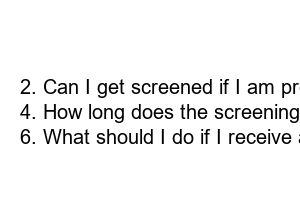자궁경부암 검사 무료대상
Are you worried about cervical cancer but can’t afford screening? Good news! **Free cervical cancer screening** is available at various health centers across the country.
**What is cervical cancer screening?**
Cervical cancer screening involves testing for abnormal cells in the cervix that could potentially develop into cancer. This is usually done through a Pap smear or HPV test.
**Why is it important to get screened?**
Early detection of cervical cancer can significantly increase the chances of successful treatment. Regular screening can help catch any abnormalities before they develop into cancer.
**Who is eligible for free screening?**
Many health centers offer free cervical cancer screening to women who are uninsured or underinsured. Check with your local health department or Planned Parenthood for more information.
**How often should you get screened?**
It is recommended that women between the ages of 21 and 65 get screened every 3-5 years, depending on their age and risk factors. Consult with your healthcare provider to determine the best screening schedule for you.
**What can you expect during the screening process?**
During a Pap smear, a healthcare provider will collect cells from the cervix using a small brush or spatula. The sample is then sent to a lab for testing. The HPV test involves testing for the presence of the human papillomavirus, which is a common cause of cervical cancer.
**What happens if abnormal cells are found?**
If abnormal cells are found during screening, further tests or treatments may be necessary. Your healthcare provider will discuss the next steps with you and provide any necessary support.
**In summary, free cervical cancer screening is vital for early detection and prevention of cervical cancer. Take advantage of this valuable resource and prioritize your health. Don’t let cost be a barrier to getting screened. Your well-being is worth it.**
**FAQs:**
1. Is free cervical cancer screening available in every state?
2. Can I get screened if I am pregnant?
3. Are there any age restrictions for free screening?
4. How long does the screening process take?
5. Will my results be kept confidential?
6. What should I do if I receive abnormal results?

